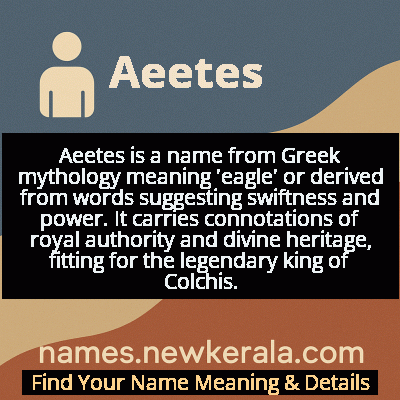Aeetes Name Meaning & Details
Origin, Popularity, Numerology Analysis & Name Meaning of Aeetes
Discover the origin, meaning, and cultural significance of the name AEETES. Delve into its historical roots and explore the lasting impact it has had on communities and traditions.
Name
Aeetes
Gender
Male
Origin
Greek
Lucky Number
1
Meaning of the Name - Aeetes
Aeetes is a name from Greek mythology meaning 'eagle' or derived from words suggesting swiftness and power. It carries connotations of royal authority and divine heritage, fitting for the legendary king of Colchis.
Aeetes - Complete Numerology Analysis
Your Numerology Number
Based on Pythagorean Numerology System
Ruling Planet
Sun
Positive Nature
Leaders, ambitious, highly driven, self-reliant, innovative.
Negative Traits
Overly aggressive, domineering, impatient, selfish.
Lucky Colours
Red, orange, gold.
Lucky Days
Sunday.
Lucky Stones
Ruby, garnet.
Harmony Numbers
2, 3, 9.
Best Suited Professions
Entrepreneurs, managers, engineers.
What People Like About You
Courage, determination, leadership.
Famous People Named Aeetes
Aeetes of Colchis
Mythological King
Ruler of Colchis who possessed the Golden Fleece and father of Medea
Aeetes (Literary Character)
Mythological Figure
Central figure in the Argonautica epic and Jason's quest for the Golden Fleece
Aeetes (Artistic Depictions)
Mythological Subject
Frequently portrayed in ancient Greek pottery and later European art as a powerful monarch
Name Variations & International Equivalents
Click on blue names to explore their detailed meanings. Gray names with will be available soon.
Cultural & Historical Significance
The story of Aeetes and the Argonauts has been interpreted as representing Greek colonial expansion and encounters with foreign cultures. His character demonstrates the complex Greek attitude toward 'barbarian' rulers—respect for their power and wealth, but ultimately viewing them as obstacles to be overcome by Greek heroism and cunning. The betrayal by his daughter Medea adds layers to his cultural significance, representing the breakdown of traditional family loyalty and the transformative power of love and ambition. Throughout Western literature and art, Aeetes has remained a symbol of royal authority challenged, the guardian of precious knowledge or artifacts, and the embodiment of the exotic 'other' that heroes must confront to achieve greatness.
Extended Personality Analysis
Aeetes is characterized by an authoritative and commanding personality, reflecting his royal status and divine heritage. As a king descended from the sun god Helios, he exhibits natural leadership qualities, confidence, and a strong sense of entitlement to his position and possessions. His determination and protective nature are most evident in his fierce guardianship of the Golden Fleece, which he considers both a royal treasure and a symbol of his power. However, these positive traits are balanced by less admirable qualities—his stubbornness in refusing Jason's reasonable request for the fleece, his tendency toward rage when challenged, and his willingness to set impossible, deceptive tasks that reveal a cunning and somewhat treacherous nature.
The mythological accounts portray Aeetes as possessing strategic intelligence and political acumen, demonstrated by his clever challenges to Jason and his understanding of maintaining power. Yet his personality also shows vulnerability, particularly in his relationship with his children. His eventual loss of both the Golden Fleece and his daughter Medea reveals the tragic dimensions of his character—a powerful ruler brought down by his own inflexibility and the consequences of his actions. This complexity makes Aeetes more than a simple villain; he represents the archetype of the established authority figure who cannot adapt to changing circumstances, ultimately leading to his downfall despite his considerable power and resources.
Modern Usage & Popularity
In contemporary contexts, Aeetes remains almost exclusively a mythological name with virtually no usage as a given name in modern birth records. Its appearance is largely confined to academic discussions of Greek mythology, classical literature courses, and specialized publications on ancient epic poetry. The name occasionally surfaces in modern adaptations of the Argonaut myth in fantasy literature, video games, and film, where it serves to maintain classical authenticity. Unlike many other Greek mythological names that have seen revivals in modern naming trends, Aeetes has resisted popular adoption, likely due to its strong association with a primarily antagonistic character and its somewhat challenging pronunciation for English speakers. However, it maintains a niche presence among classical scholars and mythology enthusiasts who appreciate its historical significance and connection to one of the most enduring stories from Greek antiquity.
Symbolic & Spiritual Meanings
Aeetes symbolizes several profound concepts that transcend his specific mythological role. Primarily, he represents the guardian of sacred or valuable knowledge—the Golden Fleece serving as a metaphor for wisdom, power, or spiritual enlightenment that seekers must earn through trial and perseverance. As the son of the sun god Helios, he embodies solar symbolism: illumination, royal authority, and the life-giving but also destructive power of the sun. His character also represents the established order and tradition that must be challenged for progress to occur, making him a symbolic obstacle necessary for heroic development and transformation. The geographical location of his kingdom, Colchis at the edge of the known world, positions him as a symbol of the exotic 'other'—the mysterious, wealthy civilizations that both attracted and threatened the Greek worldview. Furthermore, his relationship with his daughter Medea makes him a symbol of patriarchal authority challenged by new generations and changing values, representing the inevitable conflict between preservation and transformation in cultural and personal evolution.

